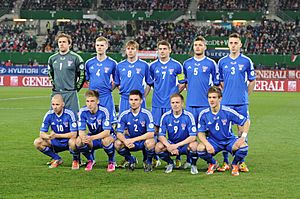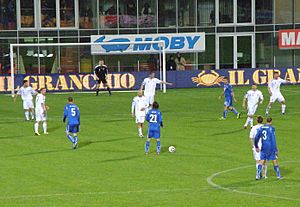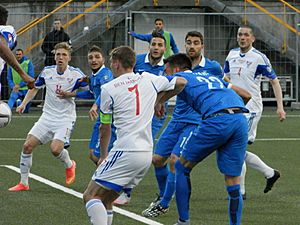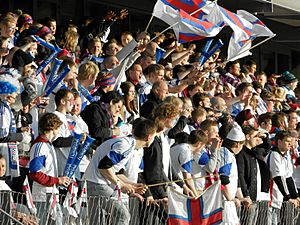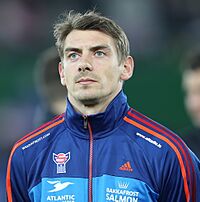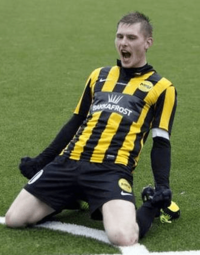Faroe Islands national football team facts for kids
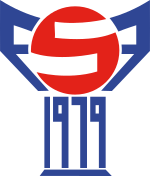 |
||||
| Nickname(s) | Landsliðið (The National Team) | |||
|---|---|---|---|---|
| Association | Fótbóltssamband Føroya | |||
| Confederation | UEFA (Europe) | |||
| Head coach | Eyðun Klakstein | |||
| Captain | Hallur Hansson | |||
| Most caps | Fróði Benjaminsen (96) | |||
| Top scorer | Rógvi Jacobsen Klæmint Olsen (10) |
|||
| Home stadium | Tórsvøllur | |||
| FIFA code | FRO | |||
|
||||
| FIFA ranking | ||||
| Current | 97 |
|||
| Highest | 74 (July 2015, October 2016) | |||
| Lowest | 198 (September 2008) | |||
| Elo ranking | ||||
| Current | 147 |
|||
| Highest | 136 (March 2018) | |||
| Lowest | 173 (4 June 2008, 10 September 2008) | |||
| First international | ||||
(Tórshavn, Faroe Islands; 2 July 1988) |
||||
| Biggest win | ||||
(Tórshavn, Faroe Islands; 7 June 2021) (Marbella, Spain; 22 March 2024) |
||||
| Biggest defeat | ||||
| Unofficial (Keflavík, Iceland; 10 July 1985) Official (Belgrade, Yugoslavia; 16 May 1991) (Bucharest, Romania; 6 May 1992) (Toftir, Faroe Islands; 11 August 1993) (Toftir, Faroe Islands; 6 October 1996) |
||||
| Baltic Cup | ||||
| Appearances | 1 (first in 2024) | |||
| Best result | Fourth place (2024) | |||
| Island Games | ||||
| Appearances | 2 (first in 1989) | |||
| Best result | Champions (1989, 1991) | |||
| Greenland Cup | ||||
| Appearances | 3 (first in 1980) | |||
| Best result | Champions (1983, 1984) | |||
The Faroe Islands national football team represents the Faroe Islands in international football games. It is managed by the Faroe Islands Football Association (FSF). The FSF joined FIFA in 1988 and UEFA in 1990. The Faroe Islands is the fourth-smallest UEFA country by population.
The team has never reached the final tournaments of the FIFA World Cup or UEFA European Championship. However, they won the Island Games in 1989 and 1991. In 2024, they played in the Baltic Cup for the first time and finished fourth. In the Faroe Islands, the team is known as the landsliðið, which means "The National Team". They play their home matches at Tórsvøllur stadium.
Contents
- History of Faroese Football
- Early Years and Friendly Matches (1930–1988)
- Joining FIFA and the Landskrona Miracle (1988–1993)
- The Allan Simonsen Era (1994–2001)
- The Henrik Larsen Years (2002–2005)
- The Jógvan Martin Olsen Years (2006–2008)
- The Brian Kerr Years and a New Generation (2009–2011)
- The Lars Olsen Years and Double Greek Victory (2011–2019)
- The Håkan Ericson Years (2019–2024)
- Stadiums
- Supporters
- Team Records
- Coaching Staff
- Players
- Honours
- See also
History of Faroese Football
Early Years and Friendly Matches (1930–1988)
Before joining FIFA, the Faroe Islands played friendly matches against nearby islands and countries. These included games against Iceland, Shetland, Orkney Islands, Greenland, and Denmark U-21. These matches were not officially recognized by FIFA.
The Faroe Islands shared the title for the most successful team at the friendly Greenland Cup tournament. They won it two years in a row, in 1983 and 1984.
Joining FIFA and the Landskrona Miracle (1988–1993)
The FSF became a member of FIFA on July 2, 1988. Their first official win was a 1–0 victory in a friendly match against Canada in 1989. The FSF then joined UEFA on April 18, 1990.
The Faroe Islands won the Island Games in 1989 and 1991. After these wins, they stopped entering the tournament. The other teams were considered too easy for them.
A famous moment in Faroese football history happened on September 12, 1990. They beat Austria 1–0 in their first-ever official competitive game. This was a qualifier for the Euro 92. The game was played in Landskrona, Sweden, because the Faroe Islands did not have grass pitches back then.
Torkil Nielsen, who was a chess player and salesman, scored the winning goal. The 32-year-old coach, Páll Guðlaugsson, became a national hero. He was known for believing his team could win against bigger nations. Goalkeeper Jens Martin Knudsen later shared that Guðlaugsson gave a powerful speech before the Austria match. He told the players to fight for their nation and flag. This win is still the most famous story in Faroese football.
One month later, the Faroe Islands lost 4–1 to Denmark. On May 1, 1991, they had another good result, drawing 1–1 against Northern Ireland. However, they lost their remaining five matches in that tournament.
The Allan Simonsen Era (1994–2001)
After the Landskrona win, Faroese football continued to improve. Many were surprised when Allan Simonsen became the new coach in 1994. He was a famous player who had won the European Footballer of the Year award in 1977. People thought he was too big a name for such a small country. Allan Simonsen coached the team for seven years. He helped the Faroese amateur players become more professional.
He asked the FSF to make the football season longer. He also asked clubs to find talented players. Both ideas were approved. These changes helped the national team succeed.
Under Allan Simonsen, the Faroe Islands won two Euro 1996 qualifiers against San Marino. They won 3–0 and 3–1. In the 1998 World Cup Qualifiers, they beat Malta twice, both times 2–1. For the Euro 2000 qualifiers, they drew three matches. These were against Lithuania (0–0), Scotland (1–1), and Bosnia (2–2). In 2002, they drew 2–2 against Slovenia in the 2002 World Cup Qualifying matches. This was their best result in World Cup qualifiers until 2018.
The Henrik Larsen Years (2002–2005)
The Football Association wanted a well-known coach. They chose Henrik Larsen, a former Danish international player who won UEFA Euro 1992. He took over from Allan Simonsen.
On September 7, 2002, in Larsen's first match, the Faroe Islands played Scotland. They led 2–0 at halftime but the game ended in a 2–2 draw.
On October 16, 2002, the Faroe Islands almost caused a big upset against Germany. They lost 2–1, but a shot hit the post in the last seconds, stopping them from getting a draw. They did manage another draw against Cyprus on October 9, 2004, in a 2006 World Cup Qualifying match.
The Jógvan Martin Olsen Years (2006–2008)
In 2006, Jógvan Martin Olsen became the first Faroese coach. He had been an assistant coach for nine years. Many experienced players retired around this time. Olsen had to build a new team with younger players. This made their results difficult. They got zero points in the Euro 2008 qualifier.
However, on June 2, 2007, they scored a goal against Italy, the world champions. They lost 2–1, but it was a close game. The Euro 2008 qualifiers were tough for the young team. They let in 43 goals and scored only four. All four goals were scored by Rógvi Jacobsen.
In the summer of 2008, the team played two friendly matches. They lost 4–3 to Estonia, scoring three goals but still losing. Later, they lost 5–0 to Portugal.
Olsen coached for the first four matches of the 2010 World Cup Qualifiers. He got a good result on October 11, 2008, drawing 1–1 against Austria. This was their first qualifying point in four years. After this, Olsen stepped down as coach.
The Brian Kerr Years and a New Generation (2009–2011)
On March 22, 2009, the Faroese team showed their future potential. They beat Iceland 2–1 in a friendly match. This was their first win ever against Iceland.
On April 5, 2009, Brian Kerr, a former manager for Republic of Ireland, became the new head coach. He quickly became popular with fans because of his personality.
On September 9, 2009, the Faroe Islands won a competitive match for the first time since 2002. They beat Lithuania 2–1.
On August 11, 2010, the Faroe Islands almost won against Estonia in the UEFA Euro 2012 qualifiers. They led 1–0, but Estonia scored two goals in extra time to win.
On October 12, 2010, the Faroe Islands drew 1–1 against Northern Ireland. Christian Holst scored for the Faroes.
On June 7, 2011, the Faroe Islands beat Estonia 2–0. Captain Fróði Benjaminsen scored a penalty, and Arnbjørn Hansen scored another goal. This was the Faroe Islands' first UEFA Euro qualification win since 1995.
Brian Kerr's contract ended on October 26, 2011, after negotiations for a new deal were unsuccessful.
The Lars Olsen Years and Double Greek Victory (2011–2019)
On November 8, 2011, Lars Olsen became the new coach. He was a former captain of the Denmark team that won the European Championship in 1992.
On March 1, 2014, the team scored four goals in a match for the first time. They beat Gibraltar 4–1 in Gibraltar's second official UEFA match. Christian Holst scored two goals. On October 11, 2013, Olsen got his first point as coach with a 1–1 draw against Kazakhstan.
On November 14, 2014, the Faroe Islands caused a huge surprise. They beat Greece 1–0 in a Euro 2016 qualifiers match. Greece was ranked 18th in the world, while the Faroe Islands were 187th. This was a 169-place difference, making it one of football's biggest upsets.
On June 13, 2015, the Faroe Islands surprised the world again. They beat Greece for a second time, winning 2–1. These two wins helped the team jump from 187th to 74th in the FIFA rankings. They finished fifth in their group with six points.
On March 29, 2016, the Faroe Islands beat Liechtenstein 3–2 in a friendly match. On September 6, 2016, they drew 0–0 against Hungary in a 2018 World Cup Qualifying match.
On October 10, 2016, the Faroe Islands defeated Latvia 2–0 in a World Cup qualifier. On September 3, 2017, they beat Andorra 1–0 at home. This win gave them a record nine points in a Euro or World Cup qualification campaign.
Lars Olsen's last match as manager was a 0–3 loss to Sweden on November 18, 2019. He is seen as the most successful manager in the nation's history since joining UEFA and FIFA. Captain Atli Gregersen also retired from international football in the same match.
The Håkan Ericson Years (2019–2024)
On December 16, 2019, the Faroe Islands Football Association hired Swedish coach Håkan Ericson.
On September 3, 2020, Ericson's team won his first match, beating Malta 3–2 in a 2020-21 UEFA Nations League game. Three days later, they won their second match in a row, beating Andorra 1–0. This was their first time winning two competitive matches in a row since 1997.
On November 17, 2020, Ericson's team won their first-ever competitive tournament. A 1–1 draw against Malta secured them the top spot in the 2020-21 UEFA Nations League D. They set a new record of 12 points in a competition, beating their previous record of 9 points from the 2018 World Cup qualifiers.
On June 7, 2021, the national team had their biggest win ever. They beat Liechtenstein 5–1 in a friendly match in Tórshavn.
On September 26, 2022, the team surprised everyone by beating Turkey 2–1 in a 2022–23 UEFA Nations League game. This win extended their unbeaten streak to four games, their longest ever. It was considered one of their best results since the two wins against Greece in 2014 and 2015.
As of September 2022, the Faroese national team had thirteen full-time professional players. They played in leagues in Belgium, Norway, Denmark, Sweden, and Iceland. In contrast, the 1990 team that beat Austria was made up entirely of amateur players.
The Faroe Islands played in the 2024 Baltic Cup. On June 8, 2024, they lost their semi-final match 4–1 against Estonia. They then lost 1–0 in the third-place playoff against Latvia on June 11. Håkan Ericson was no longer the coach after October 16, 2024. During his time, the Faroe Islands earned points in almost half of their matches, making him a very successful manager.
Eyðun Klakstein is now the permanent manager, as of February 5, 2025. He is the first Faroese manager since Jógvan Martin Olsen. In Klakstein's first two matches as manager, the Faroes beat Armenia 1–0 and lost 1–0 to North Macedonia. These results helped them stay in Nations League C for another season.
Stadiums
From 1999 to 2011, the Faroe Islands used two stadiums for home matches: Tórsvøllur and Svangaskarð. Their last match at Svangaskarð was a 2–0 win against Estonia on June 7, 2011.
Tórsvøllur has been greatly improved. It is now a modern place for concerts and sports, mainly football. New floodlights were added in 2011, and 6,000 new covered seats were installed. The stadium now has artificial grass and meets all UEFA and FIFA requirements. The work on Tórsvøllur was finished in 2021.
Supporters
The main group of supporters for the Faroe Islands team is called "Skansin". This means fort in English. Skansin was formed in 2014, after the team's 1–0 away win against Greece and the opening of their newly renovated stadium.
As of September 2021, Skansin has 600 members in the Faroe Islands. Tickets for their stand sell out for every home match. After Northern Ireland beat the Faroe Islands 3–1 in 2015, Northern Ireland player Kyle Lafferty was impressed. He said the Faroese supporters cheered for their team throughout the whole match, even when they were losing.
Drums, trumpets, and traditional folk songs are important parts of their support.
Team Records
- Players in bold are still active with Faroe Islands.
Most Appearances
| Rank | Player | Caps | Goals | Career |
|---|---|---|---|---|
| 1 | Fróði Benjaminsen | 96 | 6 | 1999–2017 |
| 2 | Jóan Símun Edmundsson | 94 | 8 | 2009–present |
| 3 | Viljormur Davidsen | 89 | 6 | 2013–present |
| 4 | Óli Johannesen | 83 | 1 | 1992–2007 |
| 5 | Sølvi Vatnhamar | 79 | 2 | 2013–present |
| 6 | Hallur Hansson | 77 | 5 | 2012–present |
| 7 | Jákup Mikkelsen | 76 | 0 | 1995–2012 |
| 8 | Gunnar Nielsen | 70 | 0 | 2009–2022 |
| 9 | Jens Martin Knudsen | 69 | 0 | 1988–2006 |
| 10 | Brandur Hendriksson | 66 | 6 | 2014–present |
| Gilli Sørensen | 66 | 1 | 2014–present |
Top Goalscorers
| Rank | Player | Goals | Caps | Ratio | Career |
|---|---|---|---|---|---|
| 1 | Rógvi Jacobsen | 10 | 53 | 0.19 | 1999–2009 |
| Klæmint Olsen | 10 | 64 | 0.16 | 2012–present | |
| 3 | Todi Jónsson | 9 | 49 | 0.18 | 1991–2005 |
| 4 | Uni Arge | 8 | 37 | 0.22 | 1992–2002 |
| John Petersen | 8 | 58 | 0.14 | 1995–2004 | |
| Jóan Símun Edmundsson | 8 | 94 | 0.09 | 2009–present | |
| 7 | Brandur Hendriksson | 6 | 66 | 0.09 | 2014–present |
| Viljormur Davidsen | 6 | 89 | 0.07 | 2013–present | |
| Fróði Benjaminsen | 6 | 96 | 0.06 | 1999–2017 | |
| 10 | Hallur Hansson | 5 | 77 | 0.06 | 2012–present |
Coaching Staff
Coaching History
| Name | From | To | P | W | D | L | GS | GA | %W | Honours | Notes |
|---|---|---|---|---|---|---|---|---|---|---|---|
| 1988 | 1993 | 25 | 2 | 3 | 20 | 9 | 76 | 8.00 | |||
| 1993 | 1993 | 1 | 0 | 0 | 1 | 0 | 4 | 0.00 | |||
| 1994 | 2001 | 52 | 8 | 7 | 37 | 37 | 119 | 15.38 | |||
| 2002 | 2005 | 26 | 5 | 2 | 19 | 24 | 62 | 19.23 | |||
| 2006 | 2008 | 20 | 0 | 1 | 19 | 8 | 64 | 0.00 | |||
| 2009 | 2009 | 1 | 1 | 0 | 0 | 2 | 1 | 100.00 | |||
| 6 April 2009 | 26 October 2011 | 19 | 2 | 3 | 14 | 10 | 46 | 10.53 | |||
| November 2011 | November 2019 | 56 | 9 | 7 | 40 | 37 | 114 | 16.07 | |||
| 16 December 2019 | 16 October 2024 | 48 | 9 | 13 | 26 | 42 | 80 | 18.75 | |||
| 16 October 2024 | Present | 2 | 1 | 0 | 1 | 1 | 1 | 50.00 |
Players
Current Squad
The players listed below were called up for the friendly match against Georgia on June 5 and the 2026 FIFA World Cup qualification match against Gibraltar on June 9.
On June 1, Martin Agnarsson and Gullbrandur Øregaard joined the team. They replaced René Joensen and Samuel Chukwudi.
Caps and goals are correct as of June 9, 2025, after the match against Gibraltar.
| No. | Pos. | Player | Date of birth (age) | Caps | Goals | Club |
|---|---|---|---|---|---|---|
| 1 | GK | Mattias Lamhauge | 2 August 1999 | 10 | 0 | |
| 12 | GK | Ari Petersen | 7 December 2002 | 0 | 0 | |
| 23 | GK | Bárður á Reynatrøð | 8 January 2000 | 13 | 0 | |
|
|
||||||
| 2 | DF | Jóannes Danielsen | 10 September 1997 | 20 | 0 | |
| 3 | DF | Viljormur Davidsen | 19 July 1991 | 89 | 6 | |
| 4 | DF | Gullbrandur Øregaard | 18 July 2002 | 2 | 0 | |
| 5 | DF | Andrias Edmundsson | 18 December 2000 | 16 | 0 | |
| 11 | DF | Martin Agnarsson | 7 December 2003 | 2 | 0 | |
| 13 | DF | Daniel Johansen | 9 July 1998 | 9 | 0 | |
| 15 | DF | Odmar Færø | 1 November 1989 | 67 | 1 | |
| 16 | DF | Gunnar Vatnhamar | 29 March 1995 | 49 | 3 | |
| 19 | DF | Jann Benjaminsen | 3 April 1997 | 8 | 1 | |
| 20 | DF | Hanus Sørensen | 19 February 2001 | 19 | 1 | |
|
|
||||||
| 6 | MF | Hallur Hansson (captain) | 8 July 1992 | 77 | 5 | |
| 8 | MF | Brandur Hendriksson | 19 December 1995 | 66 | 6 | |
| 18 | MF | Noah Mneney | 6 December 2002 | 8 | 0 | |
| 22 | MF | Jákup Andreasen | 31 May 1998 | 26 | 2 | |
|
|
||||||
| 7 | FW | Árni Frederiksberg | 12 June 1992 | 15 | 1 | |
| 9 | FW | Páll Klettskarð | 17 May 1990 | 20 | 0 | |
| 10 | FW | Patrik Johannesen | 7 September 1995 | 26 | 2 | |
| 11 | FW | Petur Knudsen | 21 April 1998 | 23 | 1 | |
| 14 | FW | Jóan Símun Edmundsson | 26 July 1991 | 94 | 8 | |
| 17 | FW | Adrian Justinussen | 21 July 1998 | 15 | 1 | |
| 21 | FW | Poul Kallsberg | 4 February 2003 | 1 | 0 | |
Recent Call-ups
The following players have been called up in the last 12 months.
| Pos. | Player | Date of birth (age) | Caps | Goals | Club | Latest call-up |
|---|---|---|---|---|---|---|
| GK | Teitur Gestsson | 19 August 1992 | 24 | 0 | Retired | v. |
|
|
||||||
| DF | Samuel Chukwudi | 25 June 2003 | 5 | 0 | v. |
|
| DF | Ási Dam | 18 December 2002 | 0 | 0 | v. |
|
|
|
||||||
| MF | René Joensen | 8 February 1993 | 62 | 3 | v. |
|
| MF | Arnbjørn Svensson | 1 August 1999 | 2 | 1 | v. |
|
| MF | Géza Dávid Turi | 6 October 2001 | 0 | 0 | v. |
|
| MF | Sølvi Vatnhamar | 5 May 1986 | 79 | 2 | v. |
|
| MF | Stefan Radosavljevic | 8 September 2000 | 10 | 1 | v. |
|
|
|
||||||
| FW | Meinhard Olsen | 10 April 1997 | 36 | 1 | v. |
|
| FW | Jóannes Bjartalíð | 10 July 1996 | 35 | 3 | v. |
|
| FW | Hannes Agnarsson | 26 February 1999 | 9 | 0 | v. |
|
|
||||||
Honours
Non-FIFA Competitions
- Island Games
- Gold medal (2): 1989, 1991
Friendly Competitions
- Greenland Cup
- Champions (2): 1983, 1984
- Runners-up (1): 1980
See also
 In Spanish: Selección de fútbol de las Islas Feroe para niños
In Spanish: Selección de fútbol de las Islas Feroe para niños
- Faroe Islands national under-21 football team
- Faroe Islands women's national football team
 | John T. Biggers |
 | Thomas Blackshear |
 | Mark Bradford |
 | Beverly Buchanan |


